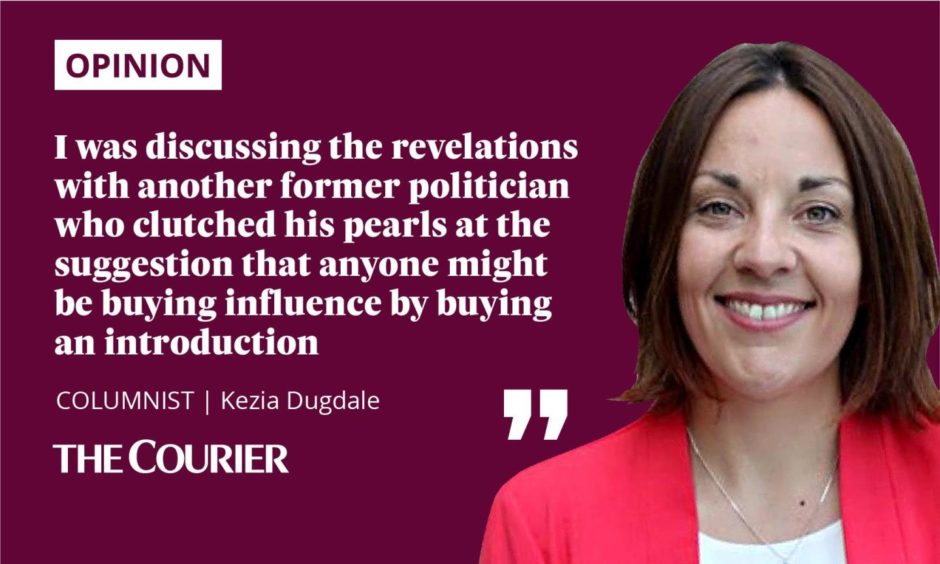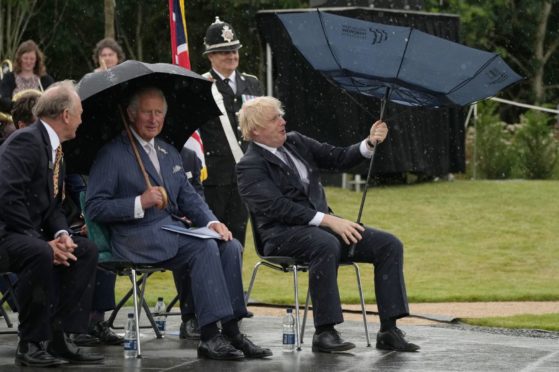What role, if any, should private money play in our politics? It’s a question that’s been burning in my mind this week following the latest cash for access row.
A sensational splash in the Sunday Times alleged elite businessmen were buying introductions to senior decision makers, the Royal Family and other members of the British establishment through a secretive club run by Conservative party chair Ben Elliot.
Of course, what we called cash for access in the mid 1990s, we’re now encouraged to call “access capitalism”.
We’re told it’s nothing more than the commodification of a simple introduction. It’s just lunch, darling. Nothing to see here.

It begs the question – why are we so reluctant to use the word corruption?
And much like the baffling custom that dictates the worst offence a politician can commit in the parliamentary chamber is to call another politician a liar, regardless of how compelling the case, it leaves us attempting to all kinds of linguistic acrobatics.
I was discussing the Sunday Times revelations on the radio this week with another former politician who clutched his pearls at the suggestion that anyone might be buying influence by buying an introduction.
He wanted to know where the evidence was. As if the absence of any immediate red hand was absence of any crime at all.
Conservative party chairman Ben Elliot arranged for his company’s clients to buy PCR and antibody tests for hundreds of pounds in the midst of a national shortage during the deadly first wave of the pandemic https://t.co/gFIz5LBlB9
— The Times (@thetimes) August 2, 2021
Why would a senior businessman pay for access to a senior businessmen if it were not for the opportunity to express an opinion or influence a decision?
Why do seriously rich people back particular political parties, if it’s not to give them an edge over the opponents and put them in a prime position to deliver on their particular political view of the world?
The money might lead to a political outcome, or it might just drive a particular political discussion.
While one is quite clearly more serious than the other, both should make us uncomfortable.
Cash for access or contracts for contacts
Chumocracy is another word coined in these pandemic days.
It’s a euphemistic phrase for an unpalatable trend of government contracts going to family contacts, university friends and fellow golf club members of government ministers.
With all previous understanding of due process and open procurement thrown to the wind because of a desperate need to buy things like personal protective equipment and quick.
The Good Law Project are doing some outstanding work in the English courts evidencing the extent of this practice at the moment.
The sum total of stories like this, of a little corruption here and a dodgy deal over there, takes us to a place where we’re no longer that angry about it all because it just seems so normal.
A collective shrug of the shoulders, as if the public are saying “well what did you expect from politicians”.
And that leaves me feeling very uneasy. Both the sense that we’re just not that shocked anymore and also that it’s so standard there’s no great desire to do anything about it.
Especially when there are plenty of ideas out of there around how to make it better and more people who still believe in politics as a force for good.
What price good politics?
One of the solutions starts with us all accepting that politics costs money.
Campaigns and elections cost money. Especially if political parties are in the business of persuasion, bringing people to their cause from another or to the ballot box for the first time.
If we accept that’s a fundamental plank of a health functioning democracy, why can’t we have more rational, transparent and honest conversations about where that money comes from?
Labour take pride in the fact they are funded by the donations of ordinary trade union members. Yet how that money is spent is a decision for senior trade union leaders
This shouldn’t be a conversation about what we call high net worth individuals, aka the seriously rich.
Nor is it just a conversation for those parties who present themselves as pro-business and therefore more inclined to pursue super wealthy individual donors.
It’s an issue for all parties, on the right and on the left.
Labour for example take a great deal of pride in the fact they are funded by the donations of hundreds of thousands of ordinary trade union members.
Yet just how that money is spent is a decision for senior trade union leaders.
Taxpayer cash for access to a fairer system
The argument for those on the left is less about the cleanliness of the cash, and more about reliance on that one source of funding.
Would any other sustainable serious organisation be so exposed to just one form of income?
All this points to a decent case for the state funding of political parties – setting limits on what can be spent, regulating how it can be spent and negating the need for parties to raise all the cash themselves.
You might hate the idea of your hard earned taxes going to political parties, but if the choice is a between a transparent, fair system and one funded by wealthy people who can hijack public policy, I know what I’d spend my last tenner on.
